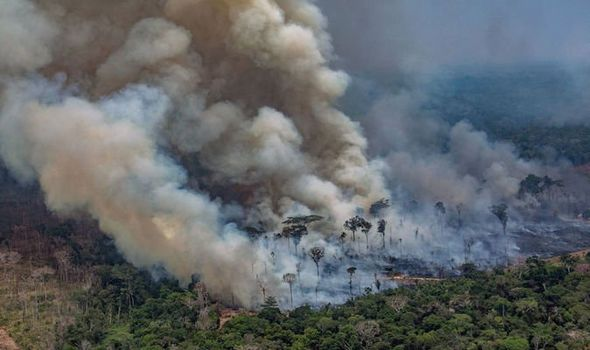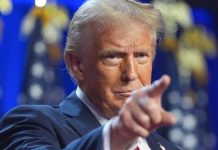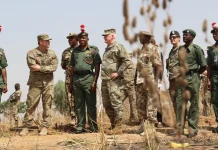The Brazilian government has said it will reject an offer of aid from G7 countries to help tackle fires in the Amazon rainforest.
French President Emmanuel Macron – who hosted a G7 summit that ended on Monday – said $22m (£18m) would be released.
Brazilian officials gave no reason for turning down the money. But President Jair Bolsonaro has accused France of treating Brazil like a colony.
His defence minister said the fires in the Amazon were not out of control.
The minister, Fernando Azevedo e Silva, said 44,000 soldiers had been deployed to combat the fires and environmental crimes in the Amazon.
Commenting on the G7 offer of aid, Mr Bolsonaro’s chief of staff, Onyx Lorenzoni, told the Globo news website: “Thanks, but maybe those resources are more relevant to reforest Europe.”
“Macron cannot even avoid a predictable fire in a church that is part of the world’s heritage, and he wants to give us lessons for our country?” Mr Lorenzoni added, in a reference to the fire that hit Notre-Dame cathedral in Paris in April.
He also said Brazil could teach “any nation” how to protect native forests
A record number of fires are burning in Brazil, mostly in the Amazon, according to the country’s space research agency, Inpe. President Macron last week described the fires as an “international crisis”.
Critics have accused Mr Bolsonaro of making deforestation worse in the Amazon through anti-environmental rhetoric.
What was pledged?
The $22 was announced on Monday as the leaders of the G7 – Canada, France, Germany, Italy, Japan, the UK and the US – continue to meet in Biarritz, France.
Mr Macron said the funds would be made available immediately – primarily to pay for more fire-fighting planes – and that France would also “offer concrete support with military in the region”.
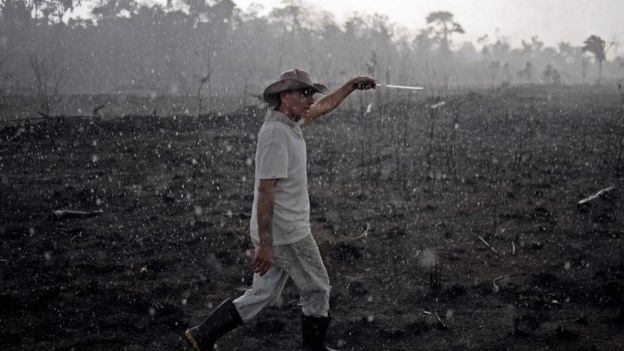 Image copyrightAFP
Image copyrightAFPBut Mr Bolsonaro – who has been engaged in a public row with Mr Macron in recent weeks – accused the French leader of launching “unreasonable and gratuitous attacks against the Amazon region”, and “hiding his intentions behind the idea of an ‘alliance’ of G7 countries”.
Despite Mr Bolsonaro’s comments, his environment minister, Ricardo Salles, initially told reporters that the funding was welcome.
What is Brazil doing?
On Friday, facing mounting pressure from abroad, President Bolsonaro authorised the military to help tackle the blazes.
The president tweeted on Sunday that he had also accepted an offer of support from Israeli Prime Minister Benjamin Netanyahu.
President Bolsonaro has previously been critical of the response of foreign governments and accused them of interfering in Brazil’s national sovereignty.
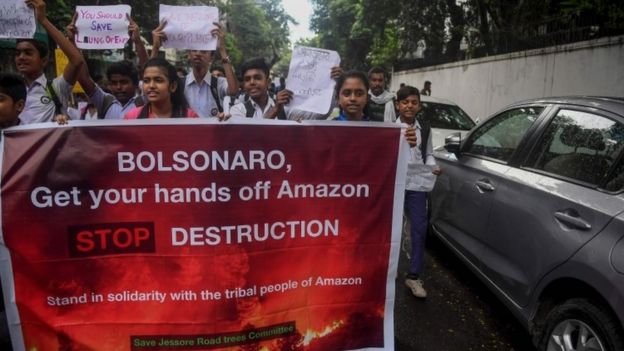
On Saturday, EU Council president Donald Tusk said it was hard to imagine the bloc ratifying the long-awaited EU-Mercosur agreement – a landmark trade deal with South American nations – while Brazil was still failing to curb the blazes.
As criticism mounted again last week, Finland’s finance minister went as far as calling for the EU to consider banning Brazilian beef imports altogether.
How bad are the fires?
Wildfires often occur in the dry season in Brazil, but satellite data published by Inpe has shown an increase of 85% this year.
President Bolsonaro has been accused of emboldening miners and loggers who deliberately start fires to deforest land illegally.
BBC analysis has also found that the record number of fires being recorded also coincide with a sharp drop off in fines being handed out for environmental violations.
Neighbouring Bolivia is also struggling to contain fires burning in its forests.
On Sunday President Evo Morales suspended his re-election campaign and said he was prepared to accept international help to tackle blazes in his country.
Why is the Amazon important?
As the largest rainforest in the world, the Amazon is a vital carbon store that slows down the pace of global warming. It spans a number of countries, but the majority of it falls within Brazil.
It is known as the “lungs of the world” for its role in absorbing carbon dioxide and producing oxygen.
The rainforest is also home to about three million species of plants and animals and one million indigenous people.
Thousands of protesters have also taken to the streets across the world calling on governments to intervene.
Source: BBC








